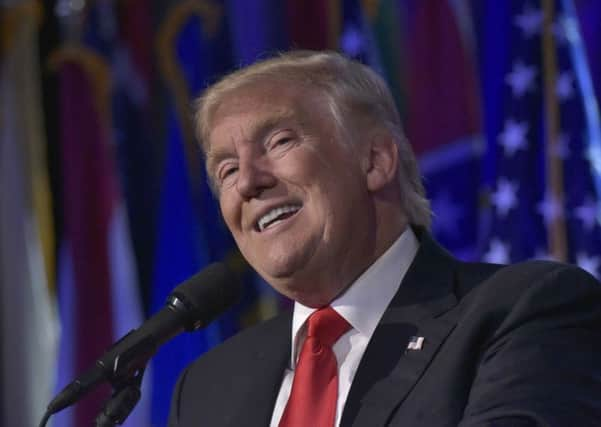Scott Macnab: Scotland must build bridges with Trump


When Barack Obama made a surprise high-profile intervention in the Scottish referendum during the final months of the campaign by backing the union, it met with a frosty reaction from the Nationalist movement. There was a sense that this was a decision for the people of Scotland to make and the US leader should have followed the example of most other European heads of state who kept their own counsel.
Fast forward two years and Nicola Sturgeon similarly broke with convention by openly endorsing Hillary Clinton in the US Presidential campaign, launching strongly worded criticism of her Republican rival, the billionaire property tycoon Donald Trump. This week, as Scotland’s First Minister posted off a letter of congratulations to the new President-elect, flagging up his Scottish roots and our “bonds of friendship”, will she wish she’d simply kept her own counsel? It’s not difficult to see why a female leader felt she could not simply keep her mouth shut in the face of Mr Trump’s now infamous comments about women which emerged on the election campaign trail. These have been branded “abhorrent” by the Scottish First Minister who had also stripped Mr Trump of his “global Scot” ambassadorial status after he proposed a blanket travel ban on Muslims entering the US in response to the terror threat. With Muslim parliamentary colleagues, including Scotland’s transport minister, it’s again hard to question Ms Sturgeon’s motivation for speaking out, even in another country’s election.
Advertisement
Hide AdAdvertisement
Hide AdAnd, of course, Ms Sturgeon wasn’t alone. Labour leader Kezia Dugdale actually went to the US and campaigned on behalf Ms Clinton, hitting the telephones at the Democratic candidate’s campaign HQ to drum up support. Ruth Davidson had been withering in her criticism of Trump on social media, but was among a raft of British politicians forced to tone down their approach after last Tuesday’s result, insisting Mr Trump had “tapped into the disaffection we are seeing across the world right now due to economic uncertainty”.
Other female leaders opted against getting involved. German Chancellor Angela Merkel was among those refused to take sides despite receiving a few barbs from the Republican candidate over her immigration policy, while Prime Minister Theresa May also insisted it was a matter for the US electorate to decide. And this is part of the problem for Ms Sturgeon. The election result last Tuesday was a very clear assertion of the position of Middle America. Trump swept to power on the wave of popular uprising, similar to that we’ve seen against political elites across the West in recent years. Hillary Clinton was seen to embody the old, establishment politics which voters rejected. Whatever her own queasiness about events unfolding, was it really a battle for Scotland’s First Minister to get involved in? The SNP leader is adamant that this was a point of principle, making it clear to MSPs in Parliament last week that she will never turn the other cheek in the face of the behaviour exhibited by Mr Trump.
“I never want to be, I am not prepared to be, a politician that maintains a diplomatic silence,” the First Minister told MSPs, to applause from her backbenches.
It’s a sentiment which is hard to fault, but will such pronouncements come back to bite her in the harsh world of Realpolitik? Ms Sturgeon didn’t have much to say when the SNP was facing awkward questions over trade links with countries with questionable human rights records like Qatar or even China. When a £10 billion investment deal with two Chinese companies collapsed recently, a spokesman for Ms Sturgeon slammed the opposition for their hostile reaction to plans. In fact, the butt of concerns had been claims that one of the firms faced corruption allegations.
The SNP at Westminster has been calling for an end to the arms trade with Saudi Arabia amid concerns over its bombing of Yemen. Ms Sturgeon appeared to have little to say when it emerged that enterprise minister Fergus Ewing had visited the Fife defence plant linked with hardware being used in the conflict. The minister praised its support for Scottish Government strategy and recognised the “vital role” of defence.
And of course the bad blood between the SNP and new US President-elect is something which stretches back years, well beyond his triumph last week. Alex Salmond had once courted the billionaire tycoon assiduously when he was forging ahead with a golf course development in the former First Minister’s Aberdeenshire constituency. But the pair fell out spectacularly when the Scottish Government refused to intervene over plans for offshore windfarms opposite the course, amid concerns it would marr the vista from the greens. An unsavoury spat ensued between the SNP grandee and Mr Trump who traded petty insults for months. When the Commons debated a bizarre motion to ban the new US President-elect from the UK in response to his Muslim outburst, Nationalist MPs were at the heart of the push. All except Corri Wilson, who represents Turnberry. She told MPs that staff and members at the world famous club, which Trump bought over, feel his organisation has turned the place around after years of stagnation. As austerity continues to bite, Scotland cannot afford to jeopardise that kind of inward investment.
And with relations recovering with the US after the Lockerbie bomber’s release, the country does not need to make an enemy of a future US president, particularly as it remains Scotland’s most lucrative international export market and source of inward investment. It’s when these wider issues sink in that the First Minister may reflect on her high-profile intervention in this US election. She may feel she has been on the side of the angels and her approach is unlikely to do her any political damage in Scotland. But at the end of the day, Scotland the UK, the EU and the whole world is going to have to deal with the US President.
